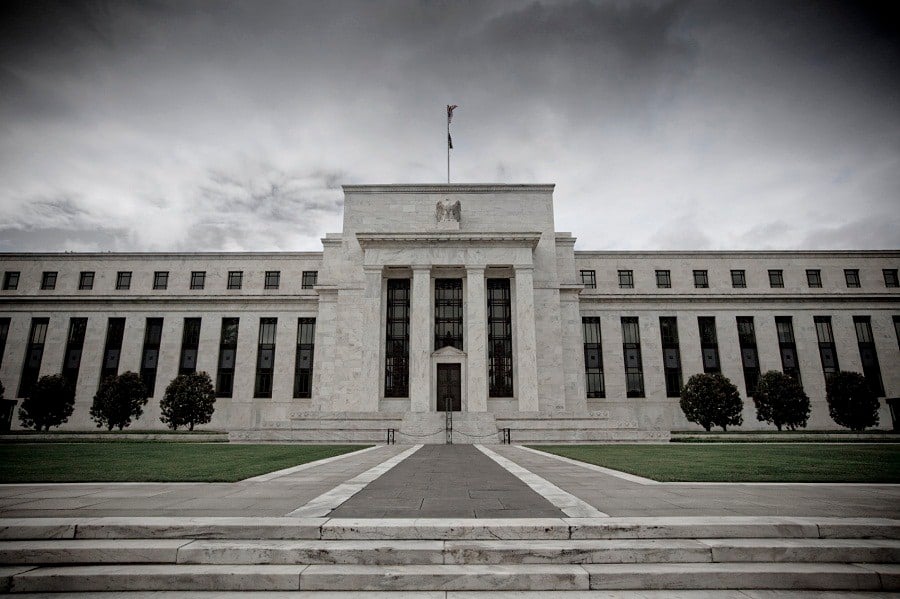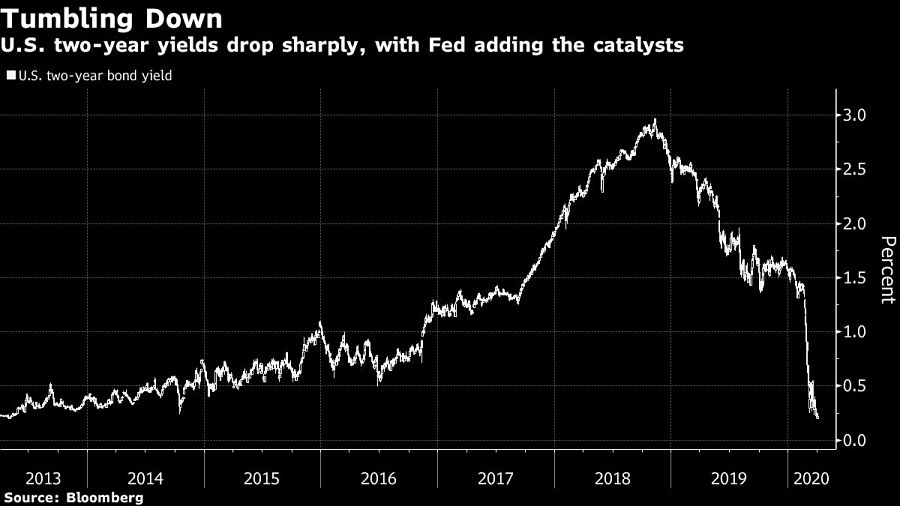

Negative yields in the $17 trillion Treasury market are a step closer to reality after the Federal Reserve eased bank capital requirements Wednesday.
The move by the Fed allows banks to take on more leverage so they can stomach further bond purchases and absorb a lack of liquidity for Treasuries following a turbulent few weeks. That’s pushing rates down, with two-year yields touching the lowest level since 2013 after the announcement, to hover just over 20 basis points above 0% Thursday. A bigger-than-expected surge in U.S. jobless claims data Thursday also helped underpin investor appetite for Treasuries and keep yields in check.

“It is adding one more stone to the edifice,” Antoine Bouvet, senior rates strategist at ING Groep, said about the Fed’s announcement.
“With no end in sight for the economic damage of the epidemic, this is one of the best risk-reward trades out there,” he said, referring to holding two-year Treasuries.
Over $10 trillion of investment-grade bonds have negative yields globally, with Treasuries so far providing a notable exception. In Germany, the entire yield curve dipped below 0% this year, meaning that investors who intend to hold the country’s bonds to maturity may take a loss.
Technical analysis by Bank of America’s Paul Ciana shows that a 10-year yield of zero to 0.25% is “reasonable” during the second quarter under a situation in which coronavirus-related quarantines, social distancing and medical breakthroughs prevail, he wrote in a note Thursday; a worse case, however, could see the 10-year rate drop below zero.
The number of Americans applying for unemployment benefits more than doubled to a second straight record, highlighting the devastating economic impact of the coronavirus as shutdowns widened across the country. A total of 6.65 million people filed jobless claims in the week ended March 28, according to Labor Department figures released Thursday.
The Fed temporarily relaxed the so-called leverage ratio Wednesday, meaning the biggest banks no longer have to add Treasuries and reserves into the basket of assets they’re required to maintain capital for -- significantly reducing capital requirements. The Fed said it made the decision because “liquidity conditions in Treasury markets have deteriorated rapidly.”
“Two-year yields hitting zero isn’t a massive stretch, especially if equities start to register new lows,” said John Davies, a U.S. interest-rate strategist at Standard Chartered. This “makes it more likely.”

A Texas-based bank selects Raymond James for a $605 million program, while an OSJ with Osaic lures a storied institution in Ohio from LPL.

The Treasury Secretary's suggestion that Trump Savings Accounts could be used as a "backdoor" drew sharp criticisms from AARP and Democratic lawmakers.

Changes in legislation or additional laws historically have created opportunities for the alternative investment marketplace to expand.

Wealth managers highlight strategies for clients trying to retire before 65 without running out of money.

Shares of the online brokerage jumped as it reported a surge in trading, counting crypto transactions, though analysts remained largely unmoved.
Orion's Tom Wilson on delivering coordinated, high-touch service in a world where returns alone no longer set you apart.
Barely a decade old, registered index-linked annuities have quickly surged in popularity, thanks to their unique blend of protection and growth potential—an appealing option for investors looking to chart a steadier course through today's choppy market waters, says Myles Lambert, Brighthouse Financial.
